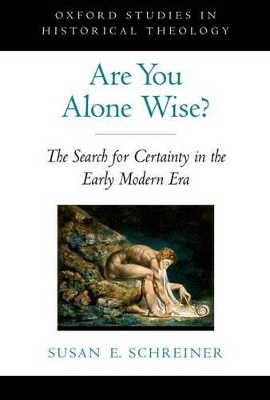
Are You Alone Wise?
The Search for Certainty in the Early Modern Era
Seiten
2012
Oxford University Press Inc (Verlag)
978-0-19-996447-5 (ISBN)
Oxford University Press Inc (Verlag)
978-0-19-996447-5 (ISBN)
In this book Susan Schreiner analyzes the pervading questions about certitude and doubt in the terms and contexts of a wide variety of thinkers during Europe in the sixteenth century. polemics and literature of the age.
The topic of certitude is much debated today. On one side, commentators such as Charles Krauthammer urge us to achieve "moral clarity." On the other, those like George Will contend that the greatest present threat to civilization is an excess of certitude. To address this uncomfortable debate, Susan Schreiner turns to the intellectuals of early modern Europe, a period when thought was still fluid and had not yet been reified into the form of rationality demanded by the eighteenth and nineteenth centuries.
Schreiner argues that Europe in the sixteenth century was preoccupied with concerns similar to ours; both the desire for certainty -- especially religious certainty -- and warnings against certainty permeated the earlier era. Digging beneath overt theological and philosophical problems, she tackles the underlying fears of the period as she addresses questions of salvation, authority, the rise of skepticism, the outbreak of religious violence, the discernment of spirits, and the ambiguous relationship between appearance and reality.
In her examination of the history of theological polemics and debates (as well as other genres), Schreiner sheds light on the repeated evaluation of certainty and the recurring fear of deception. Among the texts she draws on are Montaigne's Essays, the mystical writings of Teresa of Avila, the works of Reformation fathers William of Occam, Luther, Thomas Muntzer, and Thomas More; and the dramas of Shakespeare. The result is not a book about theology, but rather about the way in which the concern with certitude determined the theology, polemics and literature of an age.
The topic of certitude is much debated today. On one side, commentators such as Charles Krauthammer urge us to achieve "moral clarity." On the other, those like George Will contend that the greatest present threat to civilization is an excess of certitude. To address this uncomfortable debate, Susan Schreiner turns to the intellectuals of early modern Europe, a period when thought was still fluid and had not yet been reified into the form of rationality demanded by the eighteenth and nineteenth centuries.
Schreiner argues that Europe in the sixteenth century was preoccupied with concerns similar to ours; both the desire for certainty -- especially religious certainty -- and warnings against certainty permeated the earlier era. Digging beneath overt theological and philosophical problems, she tackles the underlying fears of the period as she addresses questions of salvation, authority, the rise of skepticism, the outbreak of religious violence, the discernment of spirits, and the ambiguous relationship between appearance and reality.
In her examination of the history of theological polemics and debates (as well as other genres), Schreiner sheds light on the repeated evaluation of certainty and the recurring fear of deception. Among the texts she draws on are Montaigne's Essays, the mystical writings of Teresa of Avila, the works of Reformation fathers William of Occam, Luther, Thomas Muntzer, and Thomas More; and the dramas of Shakespeare. The result is not a book about theology, but rather about the way in which the concern with certitude determined the theology, polemics and literature of an age.
Susan E. Schreiner is Professor of the History of Christianity and Theology, University of Chicago Divinity School. Her teaching and research focus on the early modern era in Europe, including the Protestant and Catholic Reformations and the Renaissance.
I: Beginnings: Questions and debates in the Fourteenth and Fifteenth Centuries ; II: "Abba! Father!": The Certainty of Salvation ; III: "The spiritual man judges all things": The Certainty of Exegetical Authority ; IV: Are You Alone Wise?: The Catholic Response ; V: Experientia: The Great Age of the Spirit ; VI: Unmasking the Angel of Light: The Discernment of the Spirits ; VII: "Men should be what they seem": Appearances and Reality ; Conclusion
| Erscheint lt. Verlag | 1.12.2012 |
|---|---|
| Reihe/Serie | Oxford Studies in Historical Theology |
| Verlagsort | New York |
| Sprache | englisch |
| Maße | 234 x 156 mm |
| Gewicht | 694 g |
| Themenwelt | Geschichte ► Allgemeine Geschichte ► Neuzeit (bis 1918) |
| Geschichte ► Teilgebiete der Geschichte ► Religionsgeschichte | |
| Geisteswissenschaften ► Philosophie ► Philosophie des Mittelalters | |
| Religion / Theologie ► Christentum ► Kirchengeschichte | |
| ISBN-10 | 0-19-996447-5 / 0199964475 |
| ISBN-13 | 978-0-19-996447-5 / 9780199964475 |
| Zustand | Neuware |
| Haben Sie eine Frage zum Produkt? |
Mehr entdecken
aus dem Bereich
aus dem Bereich
Europa 1848/49 und der Kampf für eine neue Welt
Buch | Hardcover (2023)
DVA (Verlag)
48,00 €
Giordano Bruno - ein ketzerisches Leben
Buch | Hardcover (2024)
C.H.Beck (Verlag)
29,90 €


